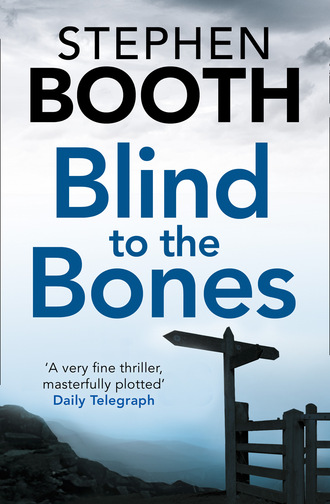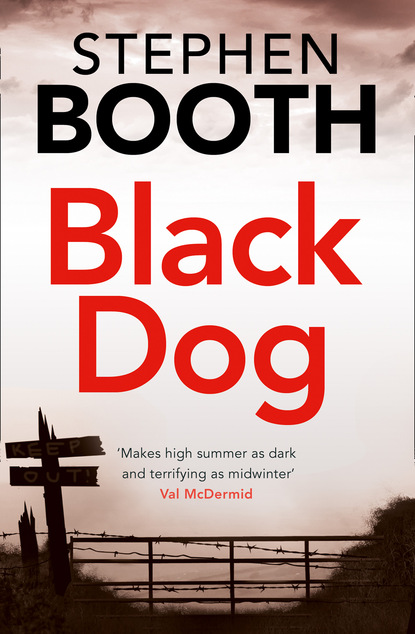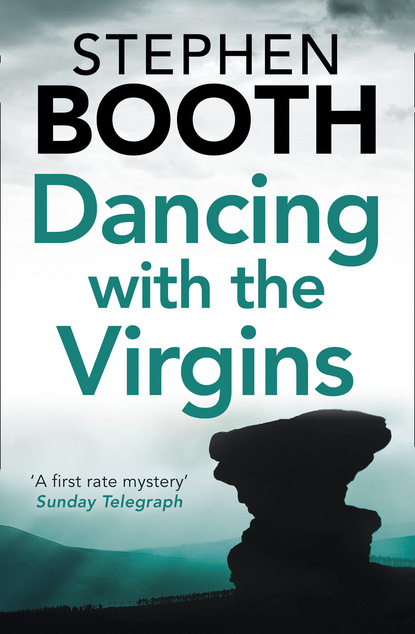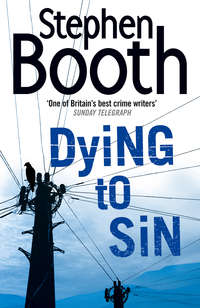
Полная версия
Blind to the Bones
Nothing moved around the air shaft except the steam that trickled out of its mouth and drifted down the valley – and, a little while later, the two black shapes that circled over Withens Moor.
3
DS Diane Fry knew all about fear. Some people were excited by it, and liked to play with the taste and smell of it, teasing their senses to the limit. But others were destroyed by its poison, eaten away by a senseless, insidious acid that seeped into their brains before they could fight it.
It wasn’t always possible to know what made you afraid. A therapist had once told her that fear conditioning could be created by a single episode, because that was the way nature had designed the human brain. It was an evolutionary advantage, a mechanism to prevent you from returning to a dangerous situation. Once frightened, forever cautious. And that was why just one sound, a single movement or a smell, could trigger the train of memory that stimulated fear. The sound of a footstep on a creaking floorboard, the sliding pattern of shadows as a door opened in the darkness, the soapy smell of shaving foam that made her nauseous even now.
The evidence bag that Diane Fry was holding contained none of those things. It contained only a grubby and stained mobile phone. So why did she feel as though the process had begun that would send her sliding down a long, dark tunnel towards the source of her fear?
‘Do the parents know about this yet, sir?’ she said.
Detective Inspector Paul Hitchens was also nothing to be afraid of, as far as Fry was concerned. He was capable enough, but had a disrespectful attitude towards his senior officers that wasn’t going to get him any further in the promotion game. It was a tendency he didn’t seem able to control, any more than Fry could control the dark shadow that had flapped and squirmed somewhere in her mind when she had picked up the bag.
‘No, Diane,’ said Hitchens. ‘In fact, we need to be a bit cautious about that. We’ll have to consider how much information we give them.’
‘Why?’
‘Mr and Mrs Renshaw are, how shall I put it … a bit difficult to talk to.’
Fry didn’t feel in the least surprised. Since she had transferred to Derbyshire Constabulary from the West Midlands, she had found most people in the Peak District difficult to talk to – including her colleagues in E Division. Not only did they find her accent strange and exotic, but they also seemed to be living in a different world entirely, a world where the city streets she had known before just didn’t exist.
‘I’d like to see exactly where the phone was discovered,’ she said.
‘Of course. The contact details are all there. It was found by members of a rambling club doing a spring clean on an overgrown footpath near Chapel-en-le-Frith. The phone was one of hundreds of bits of rubbish they picked up. If it hadn’t been wrapped up tight in a plastic carrier bag, there might not have been anything recognizable left to be found.’
Despite its condition, the mobile phone had still contained its SIM card when it was found. It had been traced via the network operators, Vodafone, to the ownership of Miss Emma Renshaw, the Old Rectory, Main Street, Withens.
Fry opened the file that Hitchens had given her. As soon as she saw the first photograph, she thought she knew what had triggered the fear. Emma Renshaw was standing in a garden, wearing a white sweater with leaping dolphins across the chest. Her hair was fair and straight, hanging almost to her shoulders, and she looked happy, but shy, and a little nervous too.
The second photograph was slightly more recent. A note said it had been taken while Emma was on a study trip in Italy. Not Venice or Florence, or even Rome – the places where everyone was supposed to go to look at art. She was in Milan, visiting contemporary design houses. But the weather had been warm and sunny in Milan. The photo showed her standing in front of a café with another girl, of Asian appearance. Emma’s hair was pulled back, revealing good cheekbones and delicate ears, which made her look more vulnerable, despite the increased confidence in her smile. She was wearing a sleeveless T-shirt, and the skin of her arms and neck was bare and pink.
‘Emma Renshaw disappeared just over two years ago,’ said Hitchens. ‘She was a student in Birmingham, where she attended the University of Central England’s School of Art and Design. She was last seen by the young people she shared a house with in Bearwood, about three miles from the art school. Bearwood is in the area called the Black Country.’
‘Yes, I know,’ said Fry.
‘Oh, of course you do.’
Fry could see the information from her personnel file gradually being dredged up into her DI’s mind. The expression on his face changed as he remembered the awful details, became embarrassed for a moment, then resumed his professional manner.
‘You’re from the Black Country yourself, aren’t you, Diane?’
‘Yes, sir. That’s where I’m from.’
The Black Country was the name given to the urban sprawl west of the city of Birmingham. Old industrial towns like Wolverhampton, West Bromwich, Dudley, Sandwell and Walsall were in the Black Country. And many smaller communities, too – like Warley, where Fry had lived with her foster parents, a string of housing estates tucked between Birmingham and the M5 motorway. Right next door to Bearwood.
‘Anyway, the house the young people shared is in Darlaston Road, Bearwood. Emma’s housemates say they left her in the house getting ready to travel home by train to Derbyshire for the Easter holidays. At least, that’s what Emma told them she was doing, and they had no reason to doubt her.’
‘The housemates being Alex Dearden, Debbie Stark and Neil Granger,’ said Fry, consulting the file.
‘They were all old friends, it seems. The two young men grew up in the same village as Emma, in Withens. Debbie Stark is from Mottram, a few miles away, but she was Emma’s best friend at high school.’
West Midlands Police had sent copies of all their files to Derbyshire – there were reports of interviews conducted with Dearden, Stark and Granger, and with several others among Emma Renshaw’s friends, neighbours, and classmates and teachers at the art school. Fry noted that the officer assigned to the missing person case had been based at the local Operational Command Unit headquarters in Smethwick – a place she knew well.
In fact, Fry could picture Darlaston Road, Bearwood, but wasn’t sure at which end of the road she would find 360B, the address Emma Renshaw had shared. Bearwood possessed most of the local shops for the Warley area. She had been there many times.
‘I’m not clear on Emma’s last-known movements,’ she said. ‘Who was individually the last to see her? Or did the young people leave the house together?’
‘Neil Granger was the last to leave, by a matter of some minutes. He was on his way to work, but had overslept. He said he had been drinking the night before.’
‘Did Granger arrive at work on time?’
‘A few minutes late,’ said Hitchens. ‘He had a car, which he drove into Birmingham. He claimed the traffic was heavy that morning, and it delayed him even more. The foreman at the site said it was unusual for Granger to be late for work, and he was normally very reliable. So he believed what Granger said, and didn’t think anything of it. He said he had a lot more to worry about with his other employees.’
Emma had been nineteen when she disappeared, and the guidelines said that immediate enquiries should be made in the case of a missing female under twenty-one. They were considered vulnerable, and, if they went missing, statistically more likely to have been the victim of a crime.
So the police officer in Smethwick who had taken the case had followed the proper procedures. Mostly. He had enquired whether Emma had done anything similar previously, and had checked the information her parents had given him against the missing person files. He had confirmed that Emma wasn’t involved in current criminal proceedings, in case she had left home to avoid prosecution for something her parents didn’t know about. He had collected all the identifying details. He had recorded her full name, age, address and description, along with the two photographs provided by the Renshaws.
‘But if Emma was going home by train, how was she planning to get to the railway station?’ said Fry.
‘By taxi – or so she told her housemates. West Midlands were unable to trace any taxi driver who picked her up from the house at Darlaston Road, or anywhere nearby. Nor was there a booking for that area where the passenger failed to appear. But I suppose she might have hailed a cab in the street.’
‘It’s unlikely, in that neighbourhood.’
Hitchens nodded. ‘But West Midlands checked that, too.’
‘I wonder why Neil Granger didn’t offer to give her a lift to the station, if he had a car?’
‘He said it was because he was already late for work, and he was afraid of getting in trouble. And Emma assured him she didn’t need a lift.’
‘So he said.’
Fry turned back to the reports. Enquiries had been made at several pubs and clubs that Emma had been known to visit. Friends and classmates had been spoken to. The university had no indication that Emma had been having problems with her work, or emotional or financial difficulties, or had any intention of leaving the course. There was a note on the bottom of the officer’s report that the parents of the missing person had agreed to any publicity.
It looked fairly comprehensive, at first glance. There was certainly a shortage of leads for West Midlands to have followed up, but all the usual enquiries had been gone through. No one had been able to suggest any reason why Emma should have decided to disappear, or anything she might have been worried about. No one had any idea where she might have gone – except back home to Withens.
‘So we need to talk to all the housemates again,’ said Hitchens. ‘Alex Dearden lives and works here, in Edendale. Neil Granger moved out of Withens, too, but not very far – he’s a few miles further down the Longdendale valley, in Tintwistle. Debbie Stark, I’m afraid, is still in the West Midlands. She got herself a job there after she graduated.’
‘Well, they could have scattered a lot further than that,’ said Fry. ‘So we should think ourselves lucky.’
But to Fry’s critical eye, the West Midlands reports had something missing. There seemed to be no air of urgency to them. Enquiries had taken place over a long period – several weeks, in fact. It was as if the officer assigned the case had been fitting it in between other jobs, when it was most convenient. And there was no mention of assistance being brought in from the local CID. No detective’s name was appended to any of the enquiry reports.
It didn’t really surprise her. In a huge metropolitan area, thousands of people were reported missing every year. Some priority was supposed to be given to women under twenty-one, but how many of those were there? And how many children and young people, too? The children were the biggest priority of all when it came to missing persons. Given a CID team already stretched to the limit by multiple murder cases, violent crime and drug problems, burglaries and car theft, how much attention could Emma Renshaw have expected, when there was no evidence that a crime had been committed?
Fry had been in that situation herself. She had worked in one of those CID offices. She guessed the officer had tried his best. But in the end, his sense of relief almost rose off the page as he concluded that the facts pointed towards Emma Renshaw having left the West Midlands, just as she had been supposed to do. He had passed the problem back to Derbyshire.
Fry shook her head, not sure whether she was puzzled, or whether she was trying to shake off the feeling that had been creeping up on her ever since she had taken the evidence bag in her hands.
‘You know, it’s all too vague, sir,’ she said. ‘It seems to me that none of Emma Renshaw’s housemates was bothered enough about her to make quite sure that Emma could get to the station all right on her own. They think she was getting a taxi, but they don’t know when, or where or how, or what taxi firm was coming to pick her up. And no one actually saw her leave the house.’
Hitchens shrugged. ‘Well, that’s the way it is, Diane. You know it happens all the time. People just disappear through the cracks.’
She nodded. Hitchens was right, of course. Throughout the country, teenagers went missing all the time, and were never seen again. But Emma Renshaw had last been seen in Bearwood, in the Black Country, no more than a mile or two from her own childhood home. That made a difference.
‘And we have to consider the other possibility …’ said Hitchens.
‘Sir?’
‘The possibility that Emma Renshaw may have lied to everyone – her parents, her friends and her housemates. She may never have intended coming home at all.’
‘Of course.’
Fry looked at the railway timetable attached to the reports. Emma had been due to catch a train from Birmingham New Street station a few minutes before eleven o’clock on the morning of Thursday, 12 April. Virgin Trains should have taken her to Manchester Piccadilly, where she would have had a quarter of an hour to change platforms and transfer to a local train. She had been expected to arrive at Glossop station at twenty past one, and her parents, Howard and Sarah Renshaw, had been waiting to collect her. But Emma hadn’t got off the train. The Renshaws had tried to call her mobile phone, but had got only the message service. So they had waited for the next train from Manchester. And the next.
The schedule filled Fry with a sense of despair. No wonder the West Midlands officer had been glad to get the case off his desk. If Emma Renshaw had left the house in Darlaston Road as planned, there were two possibilities. Either she had disappeared in Birmingham, and had never made it to the train at all. Or she had vanished when she changed trains in Manchester.
Fry was looking at the names of two of the largest metropolitan areas in Britain, cities where a girl of nineteen could melt away so easily. A change of identity, and her family would never see her again, if she didn’t want them to. Fry knew that all too well.
On the other hand, the evidence bag that she was holding contained a Motorola Talkabout with a bright blue inlay over the keys – a phone which Vodafone said had belonged to Emma Renshaw. Without a group of ramblers deciding it was time for a spring clean, the phone might have lain undiscovered for ever. If one of those ramblers hadn’t been the mum of a teenager whose mobile phone had been stolen by muggers, it would have been sent to the council tip with the rest of the rubbish. And if it hadn’t been for the police officer at Chapel-en-le-Frith who had taken the time and trouble to trace the owner of the phone, no one would ever have thought of submitting it for forensic examination.
But that’s what they had done, and the result was in Fry’s hands. Down the right side of the phone, the blue inlay was streaked with the dried residue of a dark brown liquid that had glued up the keys and trickled into the little hole where the lead for the re-charger should fit. According to the label on the bag, the stains had been confirmed as human blood.
Fry knew that she might be looking at the last remaining biological traces of Emma Renshaw. Her fingers might almost be touching the pathetic remnant of Emma’s life, a desiccated dribble of her DNA.
And that was what opened up the tunnel of fear that she had already begun to slide down.
DC Gavin Murfin had sandy hair and a pink face, and he always seemed to have dabs of tomato sauce on his lower lip. He was well past forty, yet he took no notice of any nagging about the condition of his heart. He had experience, though, and that was worth gold these days. Even Diane Fry had to admit it.
Fry found DC Murfin at his desk in the CID room, answering the phone with one hand and eating from a paper bag in the other. She waited impatiently until he put the phone down.
‘And I’ll complain to the Chief Constable about you too, madam,’ he said to the empty air. Then he looked up and grinned at Fry. ‘We’re not providing the high quality of customer service the lady expects for her Council Tax.’
‘I hope you were polite, Gavin,’ said Fry.
‘Polite? I charmed her so much that she’s coming round straight away to have sex with me.’
But Fry wasn’t in the mood for Murfin’s brand of humour.
‘Gavin, what are you doing at the moment?’
‘Eh?’
‘Nothing much, by the look of it.’
‘I’m just having a minute, like.’
‘Well, your minute’s up. There are crimes to be detected.’
‘I’ve already detected one this year, Diane.’
‘Well, it’s time to get your average up. Let’s see if we can make it one point five.’
Murfin sighed. ‘I’ll just finish this sarnie.’
Fry looked at his sandwich more closely. ‘Gavin, is that what I think it is?’
‘Bacon and sausage.’ Murfin licked a bit of the grease off his fingers, then wiped the rest of it on a forensics report.
‘There’s half an inch of fat on that bacon, Gavin. Have you never heard of cholesterol?’
‘Yes, of course I have. Me and the wife went there for two weeks’ holiday last summer.’
Fry breathed in slowly, suppressing an urge to begin screaming. She knew it came from the fear, not from anger at Murfin. It was something she would have to deal with later.
‘Get the jokes out of your system now, Gavin,’ she said. ‘We’ve got a couple called Renshaw coming in.’
Murfin gave a muffled groan from behind a mouthful of sausage. ‘You’re kidding! Not Emma Renshaw’s parents?’
‘Do you remember the case?’
‘Everyone remembers it. What have they been doing now?’
‘Who?’
‘The Renshaws, of course.’
‘Why should they have been doing anything?’
‘Well, they’re regulars. Ask Traffic.’
‘Gavin, I don’t know what you’re talking about.’
‘Then you ought to pull some of the files on the Renshaws before you talk to them. It might reduce the shock, like.’
Murfin answered the phone and pulled a face at Fry.
‘Too late. They’re here already.’
‘Bring them up then, Gavin. No, hold on a minute. Come here.’
Murfin stopped at Fry’s desk on his way out of the CID room. She opened a drawer and pulled a Kleenex tissue out of a box. She carefully wiped the tomato sauce off his chin, screwed up the tissue and threw it in the bin.
‘OK. Now you look a bit less like an overweight vampire. You won’t scare the Renshaws so much.’
‘You’re kidding. It’s me you ought to be worrying about, Diane. Those two are scarier than any vampire. They’re like something straight out of Night of the Living Dead.’
‘You’re watching the wrong videos again, Gavin. Try something a bit more sensitive.’
‘I don’t do sensitive,’ said Murfin, as he went to meet the Renshaws.
Fry sat down, took another breath and looked across the room. Opposite Gavin Murfin’s chaotic, paper-strewn desk was another that looked empty, almost abandoned. It had been cleared by its occupant before a secondment to the Rural Crime Team. The sight of the empty desk made Fry wonder if there would come a time when there was nowhere she could go for support when she needed it.
4
By full light, black-headed gulls had been drifting up from the reservoirs in the valley, scavenging for the previous night’s roadkill.
Every day, on his way into Edendale from Bridge End Farm, Ben Cooper had got used to seeing the squashed and bloodied remains of the wildlife slaughtered by traffic during the hours of darkness. Dead foxes and badgers, rabbits and pheasants, hedgehogs and stoats littered the roadway and the verges. Some of the corpses looked quite fresh until they were flattened into the tarmac by the rush of vehicles. Then their skins burst and their intestines were spread on the road, and it was impossible to tell what species they had belonged to.
It was a pretty hard lesson for the wildlife to learn. The road was part of their territory at night, attracting them because the tarmacked surface retained heat longer than the surrounding landscape. By dawn, though, the road had become a different world entirely, when it was occupied by thundering juggernauts and hurtling cars. As a battle for territory, it was the most unequal of struggles, and the fate of the victims was inevitable and predictable.
Nature never accepted defeat, though. She might lose a battle, but never the war. The gulls and the crows, and a thousand smaller scavengers, made sure the corpses didn’t go to waste. Cooper had always thought it would be a good idea to have nature on your side, rather than against you.
‘And there it is,’ said PC Tracy Udall. ‘Way down there is Withens.’
She passed Cooper the binoculars.
‘Not very scenic, is it?’ he said.
Udall shrugged. ‘It’s just Withens,’ she said.
The vantage point they had found was a lay-by on an unnamed minor road off the A628 – the only place, according to PC Udall, where Withens could be seen without actually being in it.
By 6.30 in the morning, the A628 was already busy with a constant stream of lorries and cars. But, apart from the traffic, there seemed to be no signs of human life for miles along the route through the Longdendale valley. Close to where they had turned off, there had been a pull-in on the left at the top of the hill, with an orange emergency phone provided for stranded motorists. But that was about it for civilization. As if to make the point, a sign by the roadside said: ‘Sheep for seven miles’.
To the north, above Withens, Cooper could see one of the stone air shafts for the old railway tunnels standing on a rise in a fold of the hills. Around the shaft, Withens Moor seemed to be suffering badly from erosion. Where the last layer of peat had been worn away, the bedrock was bare. Ice and rain might loosen the rock eventually, so that it slipped and crashed down on to the houses in the valley or closed the road, as had happened at Castleton.
‘You’re right, it’s not very scenic,’ said Udall. ‘It’s certainly not what the tourist brochures want. There doesn’t seem to be any colour, for a start.’
Cooper sighed. Back home at Bridge End Farm, in the limestone country of the White Peak, the banks of dazzling yellow gorse were in flower now. Many of the fields were a mass of white daisies or golden dandelions, and the umbrellas of wild garlic plants were spreading along the roadside verges, with the pale blue stars of forget-me-nots underfoot.
The warm, damp weather conditions of early spring had caused an explosion of plant growth and animal activity, with the landscape changing by the day. The swallows were nesting, the first cuckoo calling. And just now, there were swathes of bluebells in the broadleaf woods of the Eden Valley. The bluebells had to flower and seed before the tree canopy cast shade over the woodland floor, so every year they had a race against time to reproduce and survive. In this weather, even their colour would be changing – blue when the sky was overcast, and purple in sunlight.
But here was Withens, where the only colour visible was provided by the red canisters of propane gas against the outside walls of some of the houses. So there was no mains gas supply here. Probably it had been one of the last places to get electricity, too, despite the fact that the National Grid power cables ran right through the hillside. As for solar power – in Withens it would have been a joke in poor taste. The lie of the land meant that the sun would rise behind one hill to the south east and disappear behind another to the south west, without touching Withens. No wonder the gardens he could glimpse through the trees had yet to show signs of colour.
‘So what’s the situation here?’ said Cooper.
‘Well, some of the homes have been suffering from the same problems we’re getting elsewhere – recurrent burglaries, often with associated criminal damage. Particularly the more isolated homes, which are less overlooked. There’s one just past the village itself, which has been a particular target. Also the church, I’m afraid.’












